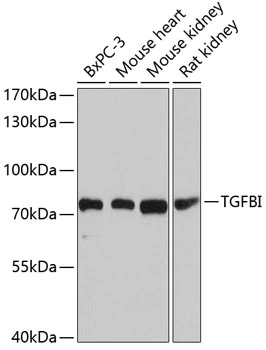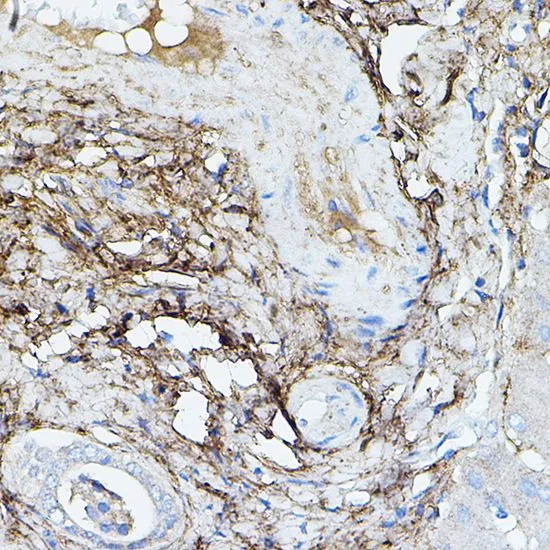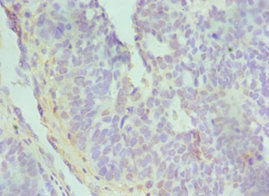
WB analysis of various sample lysates using GTX16415 TGFBI antibody. Dilution : 1:1000 Loading : 25μg per lane
TGFBI antibody
GTX16415
ApplicationsWestern Blot, ImmunoHistoChemistry, ImmunoHistoChemistry Paraffin
Product group Antibodies
ReactivityHuman, Mouse, Rat
TargetTGFBI
Overview
- SupplierGeneTex
- Product NameTGFBI antibody
- Delivery Days Customer7
- Application Supplier NoteWB: 1:500 - 1:2000. IHC-P: 1:50 - 1:200. *Optimal dilutions/concentrations should be determined by the researcher.Not tested in other applications.
- ApplicationsWestern Blot, ImmunoHistoChemistry, ImmunoHistoChemistry Paraffin
- CertificationResearch Use Only
- ClonalityPolyclonal
- ConjugateUnconjugated
- Gene ID7045
- Target nameTGFBI
- Target descriptiontransforming growth factor beta induced
- Target synonymsBIGH3, CDB1, CDG2, CDGG1, CSD, CSD1, CSD2, CSD3, EBMD, LCD1, transforming growth factor-beta-induced protein ig-h3, RGD-CAP, RGD-containing collagen-associated protein, beta ig-h3, betaig-h3, kerato-epithelin, transforming growth factor beta-induced 68kDa, transforming growth factor, beta-induced, 68kD
- HostRabbit
- IsotypeIgG
- Protein IDQ15582
- Protein NameTransforming growth factor-beta-induced protein ig-h3
- Scientific DescriptionThis gene encodes an RGD-containing protein that binds to type I, II and IV collagens. The RGD motif is found in many extracellular matrix proteins modulating cell adhesion and serves as a ligand recognition sequence for several integrins. This protein plays a role in cell-collagen interactions and may be involved in endochondrial bone formation in cartilage. The protein is induced by transforming growth factor-beta and acts to inhibit cell adhesion. Mutations in this gene are associated with multiple types of corneal dystrophy. [provided by RefSeq, Jul 2008]
- ReactivityHuman, Mouse, Rat
- Storage Instruction-20°C or -80°C,2°C to 8°C
- UNSPSC12352203








![WB analysis of HEK293 expressing human beta IG-H3 using GTX53070 TGFBI antibody [30G12].](https://www.genetex.com/upload/website/prouct_img/normal/GTX53070/GTX53070_20191119_WB_w_23060900_824.webp)
